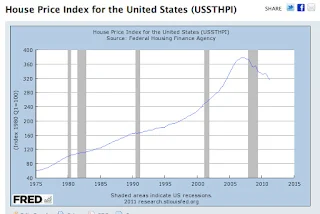Many have pointed out Gov. Sarah Palin's hypocrisy on the bailouts, especially after her book
Going Rogue appeared in late 2009, which codified her support of the extraordinary measures of 2008. I documented her statements supporting the bailouts,
here and
here.
With a speech in February 2010, however, she made news not just because she chose to give the speech in a Tea Party venue instead of at CPAC, but because she basically flip-flopped on the issue of the bailouts just months after her book had appeared.
Someone had straightened her out in the interim.
I'm actually not surprised by this shape shifting behavior, but it disqualifies her in my mind as much as the same sort of flip-flopping disqualifies a Mitt Romney or Tim Pawlenty, or even a Rick Perry. Turning currents seem to sweep people one way and then another regardless of gender these days.
The trouble, however, is that Bush was for TARP, Paul Ryan was for TARP, Nancy Pelosi was for TARP, John Boehner was for TARP, Sen. Reid was for TARP, Sen. McConnell was for TARP, Sen. Obama was for TARP, Sen. McCain was for TARP, and so was Sarah.
They're all responsible for interfering deeply and dangerously with the free exercise of the markets at a critical time when we most needed our leaders to trust in the ability of capitalism to prove its superiority to socialism, to fascism and to communism. And they all blinked.
It was a horrible failure of nerve. Many acted out of fear. And many acted out of fear of the money they would lose.
The latest speech in Iowa yesterday is a diatribe against the bailouts, against crony capitalism, and against the entrenched interests in Washington, DC. You can read the full transcript
here and make of it what you will.
It doesn't mention the banks or TARP per se, just "big finance" and Wall Street. That the public/private nexus of banking is at the heart of the mortgage debacle is nowhere in evidence, which inspires zero confidence that Sarah Palin knows anything about the correct way forward.
As a solution to our many problems the speech expresses a naivete about human nature which would be breathtaking if it came from an actual statesman, say, a Margaret Thatcher. In point of fact, Sarah Palin is as sanguine about the prospects of cleaning house as Barack Obama is about perfecting our union. Just get a new team in there and make them accountable, that'll fix it.
As if there are human beings in our world who are not corruptible.
If we really wanted a resurrection of the spirit of the founding era, it would begin with a deep suspicion of human nature and a construction of policies and institutions meant to check it as a matter of first importance. Republican enthusiasm to overturn Glass Steagall was an expression of the opposite. As a Christian Sarah Palin should know better.
As it is, the notion that good and evil dwell mixed up together in each of us might as well be an item of organic chemistry, Latin grammar or Greek philosophy. It is incomprehensible to the current generation who seem to retain boundless faith in the essential goodness of human nature, or at least of the human nature of their particular tribe.
Whether Republican or Democrat, however, this makes them all creatures of the left, including Sarah Palin.
To which I say, No, thanks.
The response from the right would be that human nature is essentially evil (David Mamet), and thus requires either theocracy or monarchy, or from the center that human nature is mixed and requires a mixed polity such as the founders bequeathed to us in the form of the constitution. The latter is classical liberalism, a kind of half-way house, and true moderation! Think gray-heads marching in the streets, but without the litter.
This is the Tea Party, a form of reactionary conservatism trying to recover a classical liberalism which looks ever smaller in the rear view mirror with every passing day. The brave new world lies dead ahead if they do not succeed.
And I do mean dead.
























